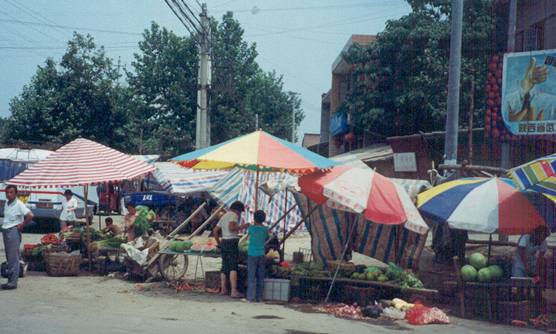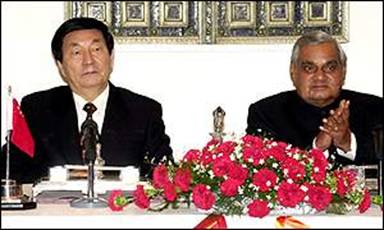By
Tirumala Rao Talasila (‘84A7)
Briefings from the Land
of the Dragon
This article describes the author's
perspective on China since his relocation from the United States
|

“You really
have to master the Chinese language to understand Chinese business and
people”, advised a 76-year old retired businessman on a flight from
Shanghai
to
Beijing
. I nodded in agreement as I looked back at my own experience. My two
semesters of Chinese in the
United States
helped, but I got a long way to go before I can master the 5000-odd
Chinese characters. What added to my confidence is the fact I
“mastered” the indecipherable “Modern Physics” during my first
semester in Pilani, circa 1984. So Chinese shouldn’t be that bad, I
comfort myself.
It
has been 8-months since I relocated to
China
after living in the
United States
for the past 15 years. I have
been going to and fro
China
since 1997 almost every year. I have seen a lot of changes within the
Chinese economic and business landscape and people’s attitudes since
then. There is no doubt that the Chinese economy is growing at a
mind-boggling rate. The landscape and economy are being continuously
reshaped. First time visitors to
China
are quite shocked at the high level of development and sophistication in
China
, especially in the coastal provinces. The 8-lane freeways are very
similar to that found in the
United States
, the only give away signs are the highway signs written in Chinese in
addition to English. The skyscrapers in
Shanghai
, a la futuristic Blade-runner kind, compete with the world’s best.
The
business environment is very unlike of the
United States
or
India
. It runs by its own rules. I am able to experience this personally in my
role of managing the subsidiary of a multinational major in
China
. Having the ability to converse with Chinese gives you a better glimpse
on the going-on in addition to bringing the credibility. Knowing the right
people is essential for success in this new business frontier.
The
pace of things in
China
is very fast. A skyscraper can appear from nowhere in a year. Business
opportunities are found and exploited within a few months. The unbridled
capitalism at work in
China
is certainly going to make Adam Smith proud. Yes, this is still a
Communist country, but only on paper. An erudite
Beijing
businessman told me after he watched “The Gangs of New York” that he
felt
China
feels similar to the environment portrayed in the movie.
China
is a new nation being born out of the principles of raw capitalism. Lots
of opportunities are up for grabs and there is the making of rubber barons
equivalent in
China
. Having established itself as the unquestioned Manufacturing Superpower,
China
is now focusing on reshaping its vast industrial and information base.
Like any other nation,
China
has its own Achilles’ heal. But the nation’s people and its leadership
are supremely confident that they are going to reclaim the economic and
political leadership on the world stage that rightly belongs to
China
.
 Foreigners
still have a lot of misconceptions about
China
. I am quite shocked at the low level of awareness at the corporate levels
in
India
about
China
. I also feel an average Chinese knows more about
India
than vice-versa. A Chinese man on the street knows about Vajpayee being
the PM of
India
, and that the famed Shaolin temple (of the 36th Chambers of Shaolin fame)
in
China
was founded by an Indian monk in the 6th century AD. On the contrary, I am
not sure an average Indian knows who the PM of
China
is, nor knows that
China
has a better quality of life factors than
India
. Foreigners
still have a lot of misconceptions about
China
. I am quite shocked at the low level of awareness at the corporate levels
in
India
about
China
. I also feel an average Chinese knows more about
India
than vice-versa. A Chinese man on the street knows about Vajpayee being
the PM of
India
, and that the famed Shaolin temple (of the 36th Chambers of Shaolin fame)
in
China
was founded by an Indian monk in the 6th century AD. On the contrary, I am
not sure an average Indian knows who the PM of
China
is, nor knows that
China
has a better quality of life factors than
India
.
 What
struck me first during my visit in 1997 as very impressive was the leap in
living standards achieved in one generation. I spoke to the average man on
the street and students in buses and trains. And the stories I hear amazed
me. I distinctly remember one conversation where a student told me how her
peasant parents now live in a 3-bedroom house with all the modern
conveniences whereas just 15 years back they lived in a house sharing with
two other families. I confirmed this story is quite common across coastal
China
. People who were previously using hand-fans can now sit in
air-conditioned homes and offices. What
struck me first during my visit in 1997 as very impressive was the leap in
living standards achieved in one generation. I spoke to the average man on
the street and students in buses and trains. And the stories I hear amazed
me. I distinctly remember one conversation where a student told me how her
peasant parents now live in a 3-bedroom house with all the modern
conveniences whereas just 15 years back they lived in a house sharing with
two other families. I confirmed this story is quite common across coastal
China
. People who were previously using hand-fans can now sit in
air-conditioned homes and offices.
There
is an infectious energy in
China
especially in the area of doing business. People are willing to do
whatever it takes to build a business and grow it big. There is tremendous
pressure in the society to succeed. There is also a growing tension in
society with this pressure and also with the disappearance of the
iron-bowl social security umbrella. The competition therefore is pretty
ferocious. This is quite evident in my conversations with business folks
and entrepreneurs in
China
.
With
regards to improving the English language skills, I have seen the
commitment of the Chinese government in action on the ground. Since my
past two visits I have seen a noticeable change in English speaking
ability. I was surprised when the person who washes hair in a hair-salon
started conversing in some rudimentary English. Even the regular guy
standing besides a soybean milk stand is now trying to say a few words in
English. The joke that is going around is that it is ‘WTO English’.
The students whom I met tell me that their government wants them to focus
on learning English more than Chinese. The roads, highways, and public
places now have signs both in Chinese and English. I have seen this
phenomenon in the Chinese hinterland not just in the coastal areas.
There is lot of respect for
India
and its intellectual firepower in
China
. Everybody in
China
knows that
India
is a software and movie powerhouse. Many Chinese are not aware that
China
and
India
had a border dispute and that both the countries went to war in 1963. The
knowledgeable ones feel there is no need for both the countries to be
hostile. When I was visiting a museum of a tomb of a Tang Dynasty royal in
interior
China
, I noticed so many artifacts that clearly had strong Indian influence. I
could have mistaken them to a temple in southern
India
. A staff of that museum remarked “Mao bought down misery to millions of
Chinese. He also started a war with
India
. Lets not be hostage to some incident in the past. These artifacts show
our common heritage and how both our cultures flourished together in the
past. We should join forces and flourish together today and in the
future”. ■
|

 Foreigners
still have a lot of misconceptions about
Foreigners
still have a lot of misconceptions about  What
struck me first during my visit in 1997 as very impressive was the leap in
living standards achieved in one generation. I spoke to the average man on
the street and students in buses and trains. And the stories I hear amazed
me. I distinctly remember one conversation where a student told me how her
peasant parents now live in a 3-bedroom house with all the modern
conveniences whereas just 15 years back they lived in a house sharing with
two other families. I confirmed this story is quite common across coastal
What
struck me first during my visit in 1997 as very impressive was the leap in
living standards achieved in one generation. I spoke to the average man on
the street and students in buses and trains. And the stories I hear amazed
me. I distinctly remember one conversation where a student told me how her
peasant parents now live in a 3-bedroom house with all the modern
conveniences whereas just 15 years back they lived in a house sharing with
two other families. I confirmed this story is quite common across coastal 

